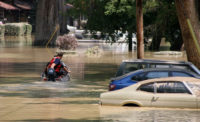The world has become significantly more dangerous for business travelers and especially for those who are given short or long-term assignments away from their home base of operations. Dramatic changes in conditions across the domestic landscape as well as across the world have driven significant enhancements to corporate travel security programs. Risks that enterprises need to consider when sending someone on business travel or assignment away from home evolve in many forms, such as:
- Natural disasters like the devastating earthquake and tsunami that hit Japan;
- Pandemics like the SARS, Ebola, Zika and recent outbreaks of Yellow Fever;
- Civil unrest, civil war, insurgency, kidnappings and other forms of criminality;
- Terrorist attacks on unsuspecting innocent people;
- Travelers arrested for transporting/possessing drugs deemed illegal in the host country despite having a legitimate prescription from a doctor in their home country; or
- LGBT travelers arrested for violation of morality or religious laws of host country.
Governments around the world have increasingly begun to implement new laws and regulations that affect how enterprises deal with the security and safety of their personnel while on business travel or foreign assignment. The United Kingdom, for example, established the Corporate Manslaughter Act which dictates criminal proceedings and potential imprisonment for corporate executives who fail to provide appropriate measures for the security and safety of their personnel while at work or while on temporary or long-term assignment. Similar health and safety-related laws have been instituted in Australia, Finland and a host of other countries. Beyond government-imposed laws and regulations, there are a broad range of standards that have evolved out of civil tort case law.
Some key areas of an enterprise’s responsibilities and liabilities of senior executives and members of the Board of Directors relative to travel security and safety include:
Duty of Care: When applied to travel security and safety, this refers to the legal responsibility of an enterprise to do everything “reasonably practical” to protect the health and safety of its employees. The precise definition of that language likely varies with the degree of risk, but ignoring the risks sets the company up for issues and potential liability in the event a traveler is hurt or killed. Enterprises have a duty to ensure a safe working environment, and case law has expanded this to include hotels, airlines, rental car companies, etc.
Duty to Disclose: Legal precedent has reinforced the need for enterprises to monitor and disclose potential risks. For example, a company has an obligation to disclose to its travelers if there is ongoing civil unrest, heightened crime, recent or threatened terrorist attacks, or a recent natural disaster or pandemic in a city, country or region. It is equally as important to inform travelers who are already on travel of conditions that may have worsened or recently evolved.
Standard of Care: If other enterprises in your industry or a like-sized company are taking steps to protect their employees, then your enterprise can be held liable for not providing a similar level of care. As a result, many companies are using travel security and safety services to capture itineraries for tracking travelers; providing risk disclosure through pre-trip information and travel security briefings; assessing the security of airlines, hotels and ground transportation; as well as keeping travelers informed of any new or changing risks as they evolve, and providing emergency assistance support when needed.
If you have made enhancements to your travel security program, I would appreciate hearing about the measures you have implemented and what the impetus was behind them.





